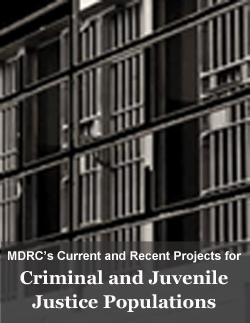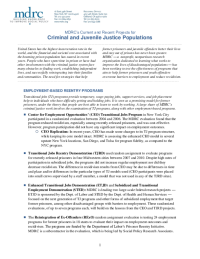MDRC’s Current and Recent Projects for Criminal and Juvenile Justice Populations

EMPLOYMENT-BASED REENTRY PROGRAMS
Transitional jobs (TJ) programs provide temporary, wage-paying jobs, support services, and job placement help to individuals who have difficulty getting and holding jobs. It is seen as a promising model for former prisoners, under the theory that people are best able to learn to work by working. A large share of MDRC’s criminal justice work involves the examination of TJ programs, along with other employment-based programs.
- Center for Employment Opportunities’ (CEO) Transitional Jobs Program in New York City participated in a randomized evaluation between 2004 and 2006. The MDRC evaluation found that the program reduced recidivism, especially among recently-released prisoners, and was cost-effective. However, program participation did not have any significant impact on employment outcomes.
- CEO Replication: In recent years, CEO has made some changes to its TJ program structure, while keeping its core model intact. MDRC is assessing the enhanced CEO model in several upstate New York locations, San Diego, and Tulsa for program fidelity, as compared to the NYC program.
- Transitional Jobs Reentry Demonstration (TJRD) used random assignment to evaluate programs for recently-released prisoners in four Midwestern cities between 2007 and 2010. Despite high rates of participation in subsidized jobs, the programs did not increase regular employment nor did they decrease recidivism. The difference in recidivism results from CEO may be due to differences in time and place and/or differences in the particular types of TJ models used (CEO participants were placed into small crews supervised by a staff member, a model that was not used in any of the TJRD sites).
- Enhanced Transitional Jobs Demonstration (ETJD) and Subsidized and Transitional Employment Demonstration (STED): MDRC is leading two large-scale federal research projects —ETJD is sponsored by the Dept. of Labor and STED by the Dept. of Health and Human Services —focused on the next generation of TJ programs and other forms of subsidized employment that target former prisoners, among other disadvantaged groups with barriers to employment. These randomized evaluations, of up to seven programs each, will build on the lessons from the CEO and TJRD projects.
- The Reintegration of Ex-Offenders (RExO) random assignment evaluation is testing 24 employment programs for former prisoners in 18 states to evaluate their impact on employment outcomes and recidivism. The programs are funded by the Department of Labor’s Prisoner Reentry Initiative. MDRC is a subcontractor in the evaluation, which is being led by Social Policy Research Associates.
PROGRAMS INVOLVING JUVENILE OFFENDERS AND AT-RISK YOUTH
- Adolescent Behavioral Learning Experience (ABLE) is cognitive behavioral therapy program for 16- to 18-year-olds detained at New York City’s Rikers Island. The project — part of the nation’s first Social Impact Bond — focuses on personal responsibility education, training, and counseling, with the goal of reducing the likelihood of re-incarceration. MDRC is overseeing the implementation of the program and Vera Institute of Justice will conduct an independent evaluation.
- The YouthBuild Evaluation is a large-scale random assignment study of this prominent “second chance” program that provides educational and vocational training, case management support, and leadership development opportunities for out-of-school youth. Many of the youth served by the program are involved with the juvenile justice system or are at risk of such involvement.
- Youth Villages Transitional Living Program provides intensive, individualized, and clinically-focused case management, support, and counseling to youth transitioning out of foster care and juvenile justice systems in Tennessee. MDRC’s random assignment evaluation will assess the program’s impact on employment, educational attainment, criminal justice involvement, and other outcomes.
- PACE Center for Girls is a Florida-based program that provides academic education, case management, and gender-specific life skills training to young women who are either involved, or at risk of becoming involved, in the juvenile justice system. MDRC is working to develop a potential random assignment evaluation of this unique “gender-responsive” model for at-risk girls.
- National Guard Youth ChalleNGe Program is an intensive residential program for high school dropouts, which combines academic instruction with military-style discipline and post-residential mentoring. In MDRC’s three-year random assignment evaluation of the program, about a third of study participants reported at least one arrest before entering the study. The program had sustained positive impacts on academic and employment outcomes for its participants, but not on delinquency.
OTHER PROGRAMS
MDRC is participating in two evaluations of reentry programs funded by the Second Chance Act, federal legislation designed to encourage the development and expand the availability of evidence-based programs that facilitate the successful return of offenders to their communities.
- The Second Chance Act Evaluation is a multi-year experimental evaluation of seven adult offender reentry demonstration programs funded under the Second Chance Act. The evaluation — led by Social Policy Research Associates, with MDRC as a subcontractor — will include impact, process, outcome, and cost assessments of reentry services at these sites.
- Demonstration Field Experiment is a multisite random assignment evaluation that is expected to test a cognitive behavioral treatment with people under correctional supervision, as well as an intervention for parole officers that involves training in evidence-based correctional practices, among other things.






